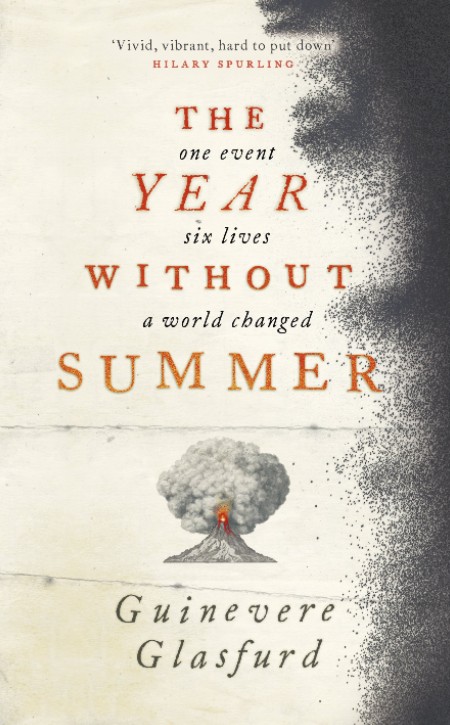
History tends to be remembered by most of us in big broad brushstroke terms.
We can rattle off dates and times, impressive statistics and jaw-dropping moments but if pressed, we are usually unable to talk about this or that epoch-defining event affected the people who lived through it.
Fortunately we have consummately skilled writers like Guinevere Glasfurd and her impressive novel The Year Without Summer to remember for us; with empathy and understanding of how extraordinary moments can transform the lives of ordinary people, she explores how a massive, climate-changing volcanic explosion in the Indonesian archipelago in 1815 (at that point, of course it was a series of largely Dutch-controlled islands) affected not simply the lives of a disparate number of people caught in its wake but of the societies of which they were a part.
Her work, told in character centric, vibrantly-told chapters that focus on one of a number of key people including novelist Mary Shelley and painter John Constable as well as a soldier named Hope Peter recently returned from the Napoleonic Wars and a woman struggling with starvation and poverty who ended up on the wrong side of Lady Justice’s scales, is an immersive undertaking which takes you deep into the near-cataclysmic events of the time.
Following the devastating eruption which violently tore 4000 ft off the towering volcano on Sumbawa Island, observed by another firsthand character ship surgeon Henry Hogg – he is based, as is so much of Glasfurd’s work on meticulously-researched historical accounts – which outright killed 12,000 and was a significant factor of times bigger than the fabled Krakatoa eruption of 1883, the Northern Hemisphere was plunged into an unending winner, causing 1816 to be labelled, rather evocatively, “The Year Without Summer”.
“Dearest Emmalina,
I write in haste as I have been called to the seas south of Makassar once more to investigate rumours of a disturbing nature. Very distinct reports, like cannons, were heard last week in Ternate, five hundred miles east of us and not easily reached. Pirates were suspected, but none found. Then, one night ago, more explosions, this time sufficient to shake our ship and the houses around the harbour, even though we were moored and Makassar peaceful. Yet more talk of pirates, who must be close at hand, fi so …
Your ever loving husband,
Henry
Surgeon aboard the Benares” (P. 3)
Evocative it may be but this poetic name signified a blight so catastrophic that Europe, heavily-reliant on seasonal good fortune, failed to produce anywhere near enough food to sustain itself, a fate which also befell North America where drought ravaged much of the East Coast to a devastating degree.
The effect on societies already grappling with great change and unrest was profound and Glasfurd gives voice to that profundity, not by elevating still more all-encompassing recounting of the day but by diving deep into the lives of a myriad of people who had nowhere to escape and who were forced to survive as best they can.
It is clear from her deeply empathetic painting of these people, both well-known and not, that they hoped, like all of us, for good and enduring things from life.
We all too easily dismiss those experience these events writ large in history as mere statistics and numbers who cared not for family, friends, careers or some kind of satisfying and contented life.
But care deeply they did, of course they did, and Glasfurd gives them a vibrant, affecting voice, telling their stories that burst from the page with such force, though they are decidedly told in un-melodramatic terms, that you will never look at history the same again.

Take the story of Sarah for instance, a poor young woman who, like so many others, is desperate to find work amidst a climate-induced economic downturn the likes of which England hadn’t seen for quite some time thanks to the ever-escalating benefits of rapacious empire.
Her plight wasn’t unique; many tens of thousand of others, including ex-soldier Hope Peter who comes home from war to find his family home demolished and the local wealthy and well-fed landowner enclosing land once commonly held by all people, are in exactly the same invidious position.
Caught in a perfect storm of events – the enclosure of land, disruptions, both material, philosophical and political caught by the French Revolution and the messy excesses of the Napoleonic period it spawned, and a growing inequity in society where farmers and landowners prospered while the poor grew still poorer and more hungry – people like Sarah are openly receptive to revolutionaries who talk of much-needed equality and fairness.
While the upper classes sneer at them with cruelly-uncomprehending scorn, little able to understand that their wont can be so great, the poor are desperate to eat and drink and be safe.
They are instead, give nothing they rather reasonably ask for, and are instead treated as criminals and executed or transported to Australia, an appalling extended instance of draconian “justice” being administered when what was needed was understanding and compassion.
It is instructive, especially in Glasfurd’s empathetic hands, that the rich chose to treat the nightmarish repercussions of Mount Tambora’s explosion as some kind of violently revolutionary act when it was in act simply driven by poor, needy people wanting to live a better life, or any life at all.
“All our voices were as one as we jumped to our feet. A tankard got banged down and another and we were hammering our hands on the tables and stamping our feet, not caring if the windows rattled loose from their frames. Let the reverend walk by or Mairster Cook or mutton chops for that matter. Let them hear and damn the lot of them.” (P. 205)
How cruel we can be as a society is driven home again and again in the rivetingly well-written The Year Without Summer, which gently but powerfully tells the story of those who failed to be heard at the time.
Even those with some modicum of access and privilege, such as Shelley and Constable, suffered as did the farmers of Vermont, over the Atlantic in the relatively recently independent United States of America who undergo crises of faith and hope in a world that seems to have given up on them.
Throughout each and every mesmerisingly affecting story, all of them told with a deep sense of humanity and a respect for who they were as flesh and blood people and not simply dispassionate footnotes in history which they most certainly were not.
In so many ways, The Year Without Summer is a masterfully compelling book which brings history alive in a fashion it is rarely afforded.
Glasfurd welcomingly digs down beyond the mind-blowing statistics and far beyond blockbuster movie-style events, which are without doubt impressive but hardly the whole story, to deliver up the real history of a time in which people, good passionate people who only wanted good things from life for themselves and their loved ones, were denied almost everything a person needs to not simply survive but live and who struggled to make sense of a world that had seemingly turned against them in every conceivable way hat mattered.